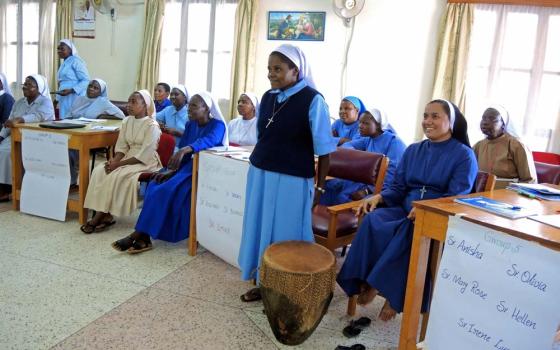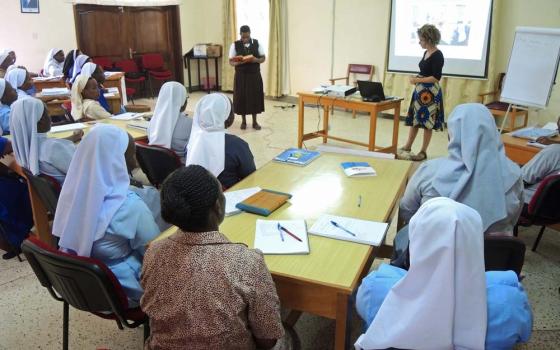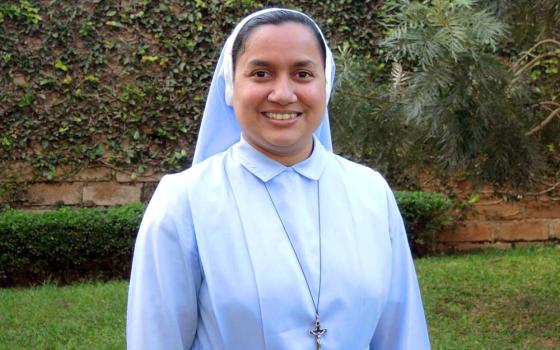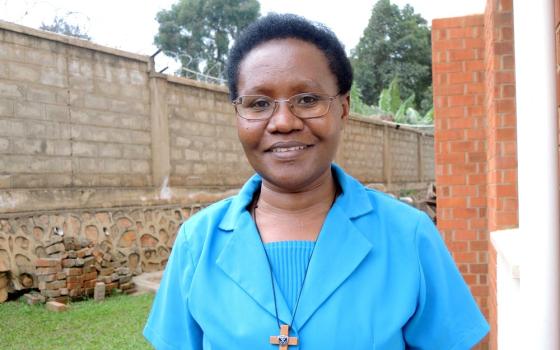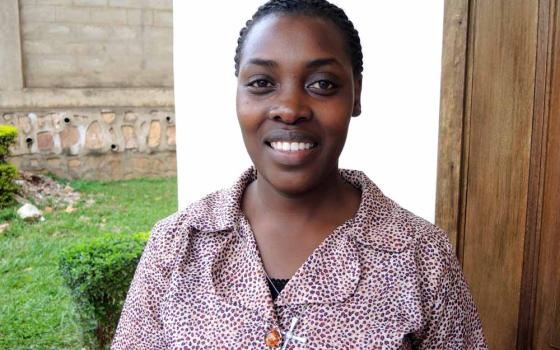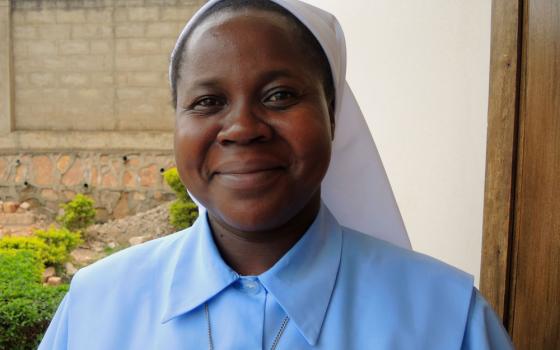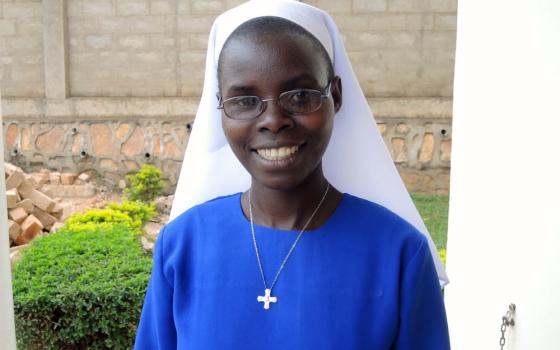Global Sisters Report is not just a news hub. We are also a platform for sisters to find their own voice.
"I don't know how to write!" the sisters usually say when they hear about GSR for the first time and we encourage them to write for us. But that's no excuse.
For the eighth time, GSR is once again handing the pen to African sisters, proving that every person is a writer, and every person has a story to tell.
This is the second time GSR has presented our writing workshop to sisters in Uganda who are studying with the Sisters Leadership Development Initiative, a program from the African Sisters Education Collaborative.
These sisters, who are studying administration to become the next generation of leaders through a three-year program, shared touching stories of joy, challenges and leadership.
Do you want Global Sisters Report to run a writing workshop for your congregation via Skype? Email info@globalsistersreport.org for more information.
A sister to all
Before I professed my final vows, I was chosen to visit a prison as part of my tertianship [pre-final vows] program. When we entered the prison, we saw many prisoners waiting for family members to visit them, but their family members had abandoned them. So it was a great joy for them to see us at that moment.
There was one elderly man, over age 60, and I spent more time with him. Before I left, he told me he wished to share something with me.
"Sister, I look at you as my daughter," he said. "You know, it's because of my family. I was working and doing everything, and poverty was killing me. So I stole something from my neighbor's house. That was the end of my life. I was put in jail. In the beginning, my family used to visit me, but now it's been so many years that no one is coming. I am now 65, and I've been in jail for decades. I was waiting for my family today, but you have come to visit me in the form of my daughter. God bless you, and continue your good work. Thank you for listening to me."
He held my hand and asked me to bless him. The tears rolled from my eyes, and I raised my hand to bless him. He was so happy, and I felt that he had shared so much with me. I left my family to be a sister, but I have family in the world. That's why I joined this congregation, to serve the vulnerable people. To be a sister, mother and daughter to all people.
— Sr. Anisha Fernandes, Missionary Sisters of Queen of the Apostles, born in India, serving in Uganda
Journeying toward positive
One thing that has been challenging for me as a sister is working with people who are HIV-positive in Kirinda, Uganda.
I started to work with people who are HIV-positive in 2007. This was an area where people had never been tested for HIV/AIDS. So my first job was going to churches, sensitizing people to the information and telling people about HIV, what it does, how we get it, and how we can prevent it.
After a few months, we were able to obtain HIV test kits from well-wishers at a hospital that was 50 km [about 30 miles] away. We started by testing 200 people. We were surprised because many people said they would not come to the testing, but we had big numbers. As a result of the tests, we found 10 of the people were HIV-positive, and I started journeying with them.
We started a small circle money-lending contribution group [also called "table banking" or SILC groups] and a drumming group. We would go to markets and other places to tell people how they can avoid getting HIV. Many people said that it was the organization of the sisters that helped them get started.
Although I am no longer working there, the group has grown even stronger in the village. They support each other in many ways, and last I heard, it had grown to more than 500 people educating their community about HIV.
— Sr. Edith Tumuhimbise, Congregation of Sisters of the Holy Cross, Uganda
Gathering a family
I joined the Medical Mission Sisters in 2009 and made my first vows in 2012. I look forward to making my final vows next year, God willing.
I have experienced real joy in community living as a sister. It is very interesting to find people of different cultures, background, tribes and nationalities coming together as sisters, and indeed, together, we make one family.
In the beginning, I felt it was strange. I wondered, how is it possible we can all live together? But I realized it is part of the miracle, a witness to the oneness we are called to live in Christ.
It doesn't mean that it's all peaceful, of course. Conflicts are multiple, but the ability to confront each other, dialogue together, step on each other's toes, challenge each other, affirm each other, support each other, forgive and reconcile with each other after a little misunderstanding, come back and celebrate together, laugh and hug, cry and wipe away each other's tears is a real witness to me that we are all one in Christ Jesus.
This has filled my heart with pure joy. It doesn't come so easily, but the moment it is achieved, it is joyful to be able to receive love and care from people I did not grow up with. Creating a family with people who are not connected by blood relationship is a true miracle and fills me with joy.
— Sr. Suzan Asinde, Medical Mission Sister, Uganda
Sharing faith, practically
I have always admired pastoral work, and when the chance was offered to me, I seized it. I was in Kazo-Mbarara District of Uganda in 2010, and my job was to teach catechism to young people who had not been baptized. I also instructed couples for their marriage, how to live well and faithful to each other.
Seeing these people come to church on Sunday, I would say to myself, "At last, I can share my faith with the rest of mankind practically and not just in words."
People came to share their problems with me, and although I had not much to give them in terms of money for school fees for their children, I advised them how to try to raise the money themselves. I encouraged them to use their lands and cultivate for both home consumption and for selling cash crops.
After some time, I was transferred and went to serve as a bursar of the secondary school at St. Catherine Girls School, but memories of my joy to work as a catechist remain in my heart. I would love to go back and do this work again. These happy moments add value in the work I will always do, and for this, I thank God.
— Sr. Justina Kebirungi, Missionary Congregation of the Evangelizing Sisters of Mary, Uganda
Finding my voice to advocate for those who have none
I learned to be a leader from working with young students who are deaf or blind. These are youth who are talented in many ways. But often, after these young girls and boys finish primary school, they are unable to continue with secondary school.
At the time, I was working as a staff member at a vocational school, which teaches professional skills.
Many of the students who are deaf or blind are very talented at craftwork. So I went to the head teacher of my vocational school and asked him to admit some of these students. He listened to me and then agreed. We helped teach them how to make woven baskets, doormats, placemats and large mats. In this way, they were earning a living and acquiring new knowledge.
After graduating, some of the students set up their own workshops. Others got vacancies in other people's workshops, and others have remained on the school premises to teach weaving to a new generation of deaf or blind students.
In the beginning of 2017, there were 47 deaf students at the school, and it is still growing through the hard work of the students and staff.
— Sr. Fausta Ktomuhendo, Sisters of Our Lady of Good Council, Uganda
[Melanie Lidman is Middle East and Africa correspondent for Global Sisters Report based in Israel.]
